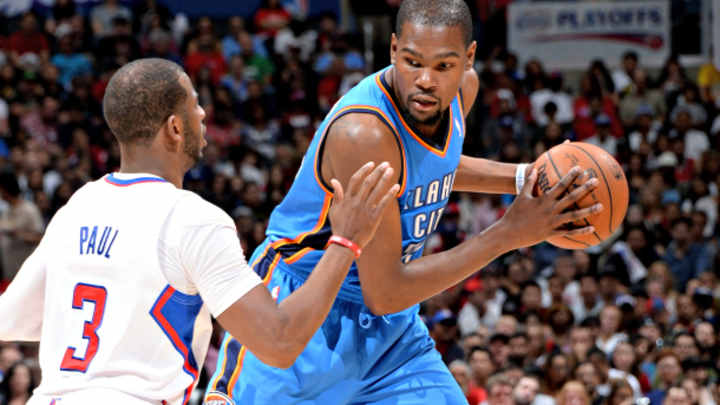Clippers' defense against Kevin Durant highlights fleeting nature of matchup ploys

Chris Paul defended Kevin Durant down the stretch of Game 4 but rarely in Game 5. (Andrew D. Bernstein/NBAE via Getty Images)

Chris Paul's defense on Kevin Durant dominated the discussion between the Clippers' Game 4 comeback and the Thunder's Game 5 rebound. Players and coaches of both teams were asked about the matchup. The phrase "brilliant coaching" was used in the framing of a question to Los Angeles' Doc Rivers. The topic consumed airtime, blog posts, Twitter timelines and column inches, both for its practical impact on the outcome of Game 4 and the intrigue of seeing a 6-foot superstar guard a near 7-foot superstar forward.
Then, with Game 5, the story went mute. It wasn't merely overshadowed by Tuesday's late drama and controversy; it was almost entirely absent from the game. Paul defended Durant for all of a few unremarkable possessions and never for any extended stretch. Rivers stayed true to his claim that the matchup had been born of desperation, a situational measure to address specific circumstances. He also communicated a certain playoff truth: The best-of-seven format may allow for tactical adjustment, but every game fundamentally remains its own unique ecosystem.
L.A.'s Game 4 success in defending Durant in the fourth quarter while the MVP was in the midst of a 40-point performance was more complex than Paul's reassignment, beginning with the crucial element of surprise. A top-heavy structure makes Oklahoma City's offense a bit inflexible. The Thunder rely so much on Durant and Russell Westbrook that any stall in their individual shot creation can lead to scoring ruts, a tendency that leaves Oklahoma City susceptible to a certain kind of matchup gambits.
Where Paul, Clippers went wrong in final possession of Game 5
If an opponent can create a situation in which Durant or Westbrook will go out of his way to bluntly attack a particular matchup, it can then position help defenders to deal with a small, controlled group of potential outcomes. A great player working independently of his teammates can be an easy target for defensive pressure, whether by the tilt of the entire team formation or through a more direct trap. The Clippers defaulted toward the latter in Game 4, which forced Durant to try to pass his way out of trouble and in the process illuminated the Thunder's problems with floor spacing. Some teams have an ingrained sense of where to be and what to do in freelance situations. Oklahoma City is not one of them, as was made all too apparent by the standstill clusters of players on the weak side of the floor where no Durant pass could reach them.
The Thunder did not quite understand how to proceed -- a deficit in situational awareness that helped the Clippers overcome a 16-point deficit in the fourth quarter. Extending the deliberate mismatch beyond that point, though, would be another matter entirely. Durant clearly knew, on some level, how the Thunder could create quality shots against the double team. With a day of practice and film, his teammates would know too. The spacing would be better. The sets would be cleaner. Scott Brooks would have prepared his team for the challenges that Paul and an incoming double team pose and a plan to work around them.
You can see that very development on Durant's first touch against Paul in Game 5. Durant not only drives at one of the league's greatest thieves but he also eludes a Blake Griffin double team, gets into the paint and sets up Steven Adams for an easy score:
Paul was undeniably splendid against Durant in Game 4. He was physical and intruded in Durant's space. He was sharp in his instincts and quick on his feet. He was also aided by smart double teams and the benefit of catching the Thunder off-guard just as the pressure in the game reached its climax -- something that would not and could not happen again in Game 5. The notion of pitting Paul against Durant for a long period is untenable for many reasons (fatigue, inevitable foul trouble, etc.), but none more so than the diminishing returns of matchup play in general. Rivers scrambled the defense to keep his team alive and he succeeded. With that move made, though, he couldn't reasonably expect to manufacture that same advantage again by reproducing the same matchup. Such desperate tactical maneuvers are ephemeral. Though those devices may be based in sound strategic thinking, they are very much specific to their time, place and circumstance.
And so 6-7 forward Matt Barnes drew the task of defending Durant, both before and throughout the Thunder's Game 5 comeback. He did a fine job through fairly conventional coverage. Durant shot only 6-of-22 from the field, but he did finish with 27 points thanks to 3-of-6 shooting from three-point range and a 12-of-12 night at the free throw line. Paul, meanwhile, was largely occupied by Westbrook, for whom the Clippers have no other counter. Darren Collison and Jamal Crawford are hopeless against his explosions to the rim. Even Paul was without much recourse, as he was left trailing on many of Westbrook's 38 points.
